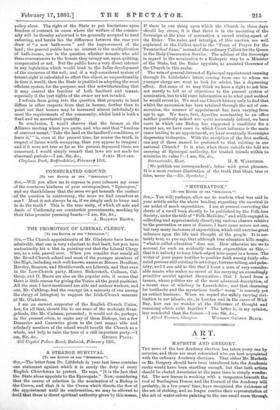A STRANGE SURVIVAL.
[To nu ED/TOR OF THE " SPECTATOR:] 'Sra,—The letter from Dr. Littledale in your last issue contains -one statement against which it is surely the duty of every English Churchman to protest. He says, "It is the fact that the State alone appoints to the Episcopate." Now, considering -that the source of selection in the nomination of a Bishop is the Crown, and that it is the Crown Which directs the flow of -the appointment until its confirmation, we may be allowed to atold that there is direct spiritual authority given by this means.
If there be one thing upon which the Church in these days should lay stress, it is that there is in the anointing of the Sovereign at the time of coronation a sacred setting-apart of the Ruler. The value and intention of this unction are well explained in the Collect used in the "Form of Prayer for the Twentieth of June," instead of the ordinary Collect for the Queen in the Holy Communion Service. The adviser of the Sovereign in regard to the nomination to a Bishopric may be a Minister of the State, but the Ruler appoints, as anointed Governor of the Church in this realm.
The vein of general distrust of Episcopal appointment running through Dr. Littledale's letter, coming from one to whom we younger clergy are wont to look for advice, has a depressing effect. But some of us may think we have a right to ask him not merely to tell us of objections to the present system of nomination, but to add some information as to what past method he would revert to. We read our Church history only to find that whilst the succession has been retained through the act of con- secration, the manner of appointment has been varying from age to age. We have, first, Apostles nominating to an office neither positively mined nor quite accurately defined, we have cases in which one Bishop has suggested a candidate for a vacant see, we have cases in which Court influence is the main cause leading to an appointment, we have eventually Sovereigns dispensing bishoprics. With the exception of the first method, can any of these named be preferred to that existing in our national Church ? Is it wise, when those outside the fold are sneering at Episcopal authority, for trusted friends within to minimise its value P—I am, Sir, &c,
Swanscombe, Kent. H. R. WAKEFIELD.
[We publish our correspondent's letter with great pleasure. It is a most curious illustration of the truth that ideas, true or false, never die.--En. Spectator.]














































 Previous page
Previous page